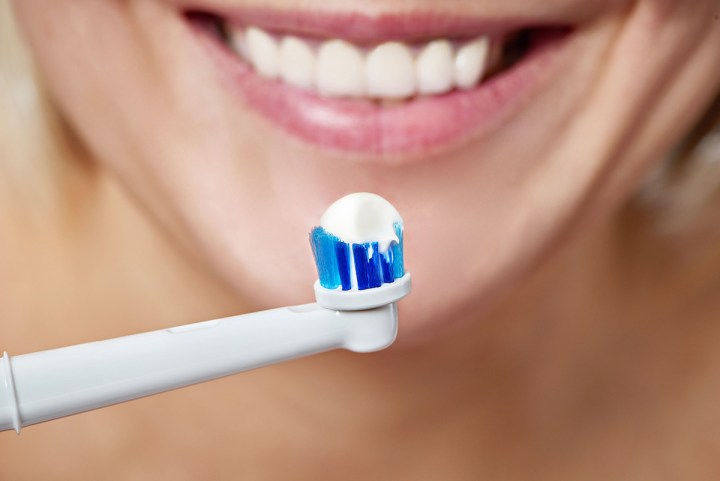
American Dental Association spokesperson Dr. Alice Boghosian spoke to Digital Trends about this gummy conundrum and told us that while there are certainly advantages to using an electric toothbrush, that doesn’t necessarily mean that it will give you cleaner teeth.
The Electric brush-aloo
An electric toothbrush does a lot more than just vibrate. The Oral-B Genius, for instance, combines motion sensors and a video feed to determine what areas of your mouth need more cleaning, and the Onvi Prophix actually has a camera in its handle, which allows you to see inside your mouth during your daily teeth cleaning session. While these smart toothbrushes come packed with a variety of features, they all have the same goal in mind: to make you brush better.
Throughout our conversation, Dr. Boghosian repeatedly said how important it was to brush for a full two minutes. Unfortunately, most people don’t even make it passed 60 seconds. Electric toothbrushes fix this problem with built-in timers. Some devices will shut off automatically after two minutes, while others use “quadpacers” that beep every 30 seconds, notifying us to brush a new quadrant of our mouths.
“If an electric toothbrush is going to get someone to brush for the full two minutes,” Dr. Boghosian told Digital Trends. “I’m all for it.” Electric toothbrushes are also great for people who have arthritis or lack the dexterity to give themselves a thorough brushing.
In addition to changing our brushing habits, electric toothbrushes may also do a more efficient job. The international, evidence-based research organization Cochrane analyzed dozens of studies and found that electric toothbrushes reduced dental plaque by 21 percent and gingivitis by 11 percent. However, Consumer Reports dental adviser Jay W. Friedman, D.D.S., M.P.H., said that the different was negligible.
“It really doesn’t matter which brush you use,” said Friedman. “We really don’t know that it matters if a little more or less plaque is removed.”
An inconvenient tooth
Electric toothbrushes certainly have some advantages over manual brushes, but they also have several drawbacks. For one, they are much more expensive. While basic models sell for about $30, high-end models like the Philips Sonicare DiamondClean Sonic Electric Rechargeable Toothbrush are listed at nearly $200. That’s a hefty price to pay for a device that only cleans marginally better than a manual toothbrush. There’s an ongoing cost for the toothbrush, too: A pack of three replacement heads will also set you back nearly $40.
Electrics are also tied to docking stations, batteries, or power chords. This may not seem like a big deal, but it can be a hassle if you have multiple electric toothbrushes in one bathroom. These peripherals also make it more difficult to use electric toothbrushes while traveling.
Of course, the biggest drawback to electric toothbrushes is that they don’t guarantee a better cleaning. While some studies have found that electric toothbrushes remove a little more plaque, most dentists will tell you that you can achieve similar results with proper brushing technique, a fluoride toothpaste, and a manual toothbrush.
“I also think that if you use a manual toothbrush properly, you can get the same results,” Dr. Boghosian said. “I think the key message is that one isn’t better than the other. They are both very effective at cleaning teeth, including a manual toothbrush when used properly.”
Whatever works
If you want white teeth, a clean mouth, and fresh breath, you’re going to have to brush twice a day, for two minutes, with a fluoride toothpaste. There’s no way around it. Whether you use a manual toothbrush or an electric one, you still need to devote a little time every day to brushing.
While an electric toothbrush can make this task a little easier, don’t expect a cleaner mouth simply because your toothbrush has batteries.
“The electric toothbrushes have really gained popularity over the past several years and I think they are just a wonderful thing,” Dr. Boghosian told Digital Trends. “If, for whatever reason, somebody thinks that an electric toothbrush is better in their mind… Whatever is going to get somebody to brush for the proper amount of time and clean their teeth, I’m all for it. It’s a motivational thing.”
If you are physically capable of (and motivated for) brushing your teeth for two straight minutes with a regular old toothbrush, you probably don’t need to spend extra cash on an electric model. However, if you have a hard time gripping a toothbrush or if you need help staying focused for two minutes, an electric toothbrush might be a great option for you.
“There’s a proper way to brush your teeth and that’s a conversation you should have with your dentist,” Dr. Boghosian said. “You have to brush for two minutes. Getting an adult to brush for two minutes is difficult. Getting a child to do it is really difficult.”
While an electric toothbrush with a built-in timer may help children and adults brush their teeth for two minutes, there is another option. Dr. Boghosian directed us to the website 2min2x.org, where you can watch two-minute videos to keep yourself entertained while you brush.
Updated on 10-04-2016 by Mike Epstein: this article originally said the Onvi Prophix has a camera at the end of its brush. The camera is actually located in the handle.
Editors' Recommendations
- Best electric toothbrush deals: Save on Colgate, Quip and Oral-B
- Can a smart sprinkler system help you use less water?
- Can you train a parrot to use Alexa, and should you?
- NestBrush is a refillable toothbrush that cleans itself with UV light
- Can you use a grill on your apartment’s balcony?


